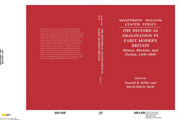Book contents
- Frontmatter
- Contents
- Preface
- WOODROW WILSON CENTER SERIES
- 1 Introduction
- 2 Precept, example, and truth: Degory Wheare and the ars historica
- 3 Truth, lies, and fiction in sixteenth-century Protestant historiography
- 4 Thomas More and the English Renaissance: History and fiction in Utopia
- 5 Little Crosby and the horizons of early modern historical culture
- 6 Murder in Faversham: Holinshed's impertinent history
- 7 Foul, his wife, the mayor, and Foul's mare: The power of anecdote in Tudor historiography
- 8 Experience, truth, and natural history in early English gardening books
- 9 Thomas Hobbes's Machiavellian moments
- 10 The background of Hobbes's Behemoth
- 11 Leviathan, mythic history, and national historiography
- 12 Protesting fiction, constructing history
- 13 Adam Smith and the history of private life: Social and sentimental narratives in eighteenth-century historiography
- 14 Contemplative heroes and Gibbon's historical imagination
- Contributors
- Index
- Titles in the series
14 - Contemplative heroes and Gibbon's historical imagination
Published online by Cambridge University Press: 04 August 2010
- Frontmatter
- Contents
- Preface
- WOODROW WILSON CENTER SERIES
- 1 Introduction
- 2 Precept, example, and truth: Degory Wheare and the ars historica
- 3 Truth, lies, and fiction in sixteenth-century Protestant historiography
- 4 Thomas More and the English Renaissance: History and fiction in Utopia
- 5 Little Crosby and the horizons of early modern historical culture
- 6 Murder in Faversham: Holinshed's impertinent history
- 7 Foul, his wife, the mayor, and Foul's mare: The power of anecdote in Tudor historiography
- 8 Experience, truth, and natural history in early English gardening books
- 9 Thomas Hobbes's Machiavellian moments
- 10 The background of Hobbes's Behemoth
- 11 Leviathan, mythic history, and national historiography
- 12 Protesting fiction, constructing history
- 13 Adam Smith and the history of private life: Social and sentimental narratives in eighteenth-century historiography
- 14 Contemplative heroes and Gibbon's historical imagination
- Contributors
- Index
- Titles in the series
Summary
For his valedictory address as Regius Professor of History in 1980, H. R. Trevor-Roper chose as his topic “History and Imagination.” He concluded that “it is the imagination of the historian, not his scholarship or his method (necessary though these are), which will discern the hidden forces of change.” “Of the great ‘philosophical’ historians,” in his judgment, “only Gibbon survives, and that not because he had a consistent philosophy, but because … his imagination never slept.” That imagination was formed, Edward Gibbon believed, by youthful immersion in ancient epic and history. In seminal statements now approximately half a century old, first Christopher Dawson and then Arnaldo Momigliano independently endorsed the view that ancient historiography was one of the formative influences on Gibbon's work.
Gibbon came to see this influence on himself and on the unbroken line of readers of the ancient texts as a mixed blessing. Only half playfully, he complains in an unpublished revision of the first chapter of The Decline and Fall that “Late generations, and far distant climates may impute their calamities to the immortal author of the Iliad. The spirit of Alexander was inflamed by the praises of Achilles: and succeeding Heroes have been ambitious to tread in the footsteps of Alexander.” One of the tasks facing historians like himself, he came to believe, was to transform or at least to enlarge humanity's conception of heroism, so that history would not share with poetry the guilt of encouraging humankind to overvalue military adventurers. But the very formation of his own historical imagination made the achievement of this aim problematic for him.
- Type
- Chapter
- Information
- The Historical Imagination in Early Modern BritainHistory, Rhetoric, and Fiction, 1500–1800, pp. 343 - 360Publisher: Cambridge University PressPrint publication year: 1997

